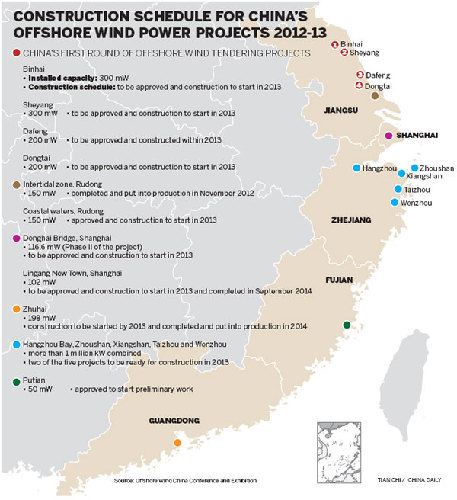Nation's wind farms heading offshore
By WANG QIAN and JIANG XUEQING (China Daily) Updated: 2013-01-29 03:34Offshore wind turbines are more demanding technically than those onshore, as they have to resist salt fog, typhoons, floating ice and other tough environmental conditions, said Ma Jinru, vice-president and secretary of the board of Goldwind Group.
"If an offshore wind turbine breaks down in strong wind, it may take days for engineers to be able to reach the turbine and fix it," she said.
 |
| Click to view the graphic in higher resolution |
Technology matures
Unexpected weather at sea is a worry for Song Lili, chief scientist at the China Meteorological Administration's Wind and Solar Energy Resources Center.
"There are extreme weather events, such as tsunamis and typhoons, that can cause severe damage to offshore wind farms," she said, suggesting that weather reports every 15 minutes will help keep wind farms operating safely.
Although China is a newcomer to offshore wind power, it has highlighted renewable energy in its future energy map.
In the 12th Five-Year Plan (2011-15), enhancing offshore wind power projects is mentioned in the local marine economy guidance for most coastal provinces, including Shandong, Jiangsu, Fujian, Liaoning, Zhejiang and Hainan.
The plan states that by 2015 the country will support offshore wind power projects, improve meteorological support and improve the installation capacity of offshore wind power turbines.
Jia, of the China Longyuan Power Group, said his company will enter the offshore wind power market in Jiangsu and Fujian.
Li Yan, who heads the climate and energy campaign for Greenpeace, said: "There is every reason that China should support wind power. Resources are abundant, production costs are being lowered and the technology is maturing, all of which make commercial development very promising."
Many see wind energy as crucial to reducing the carbon emissions scientists believe are responsible for global warming, and it may play an important role in China's sustainable development.
The nation put its first offshore wind power project out to tender in October 2010.
Ma, at Goldwind Group, said: "The first round of official bidding for the operation of offshore wind power projects has shown that the Chinese government strongly supports the trend in offshore wind power construction."
Side effects
While authorities are giving the go-ahead to boost the offshore wind power market, environmentalists are concerned about the potential impact.
China requires offshore wind power projects to avoid areas involving marine transport, military use, marine protection and mineral resources.
Greenpeace expert Zhou said this is far from sufficient, as large offshore wind farms may have side effects on wildlife, fishing and bird migration.
An official at the State Oceanic Administration, who did not want to be identified, conceded there are possible side effects, but said that before an offshore wind power project is given the go-ahead, a comprehensive environmental assessment is carried out.
By the end of 2011, China had installed a wind power generating capacity of 260 megawatts, ranking third in the world after Britain and Denmark.
Contact the writers at wangqian@chinadaily.com.cn and jiangxueqing@chinadaily.com.cn
- SOEs hit reduction goal
- University tie-ups unleash innovation
- Pledge on AT&T offers fees and risks
- GE reaps Belt and Road dividend
- CRRC eyes high-speed new maglev
- Chinese firms feel burdened by rising costs: report
- DJI's drones to home in on specific industries
- Major lenders prepare for yuan internationalization


















